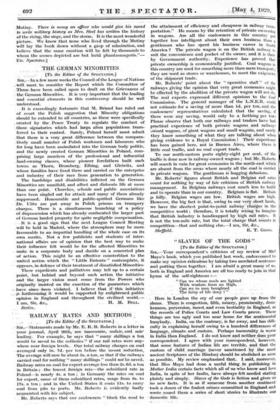RAILWAY RATES AND METHODS [To the Editqr.or the SPEorterOa.] Snr,—:Statements
made by-Mr. E. R.43. Roberts in a. letter in your journal, April -20th, -are inaccurate, unfair, and mis- leading. For example, he says that " many shillings a ton would be saved to the collieries !' • if our rail rates were any- where near foreign levels. Our total railway charges ,011 coal -averaged only 3s. 7d. per ton before the recent reduction, The average will now be about 3s. a ton, so that if the- railways carried coal for nothing" many shillings " could not be-saved. Railway rates on coal for export average less than-28.6d. a ton in Britain ; the, lowest foreign rate—the subsidized rate in Poland—is nearly 4s. a ton ; in Germany the rates on coal for export, some of them subsidized rates, range from Os. to 17s. a ton ;- and in the United States it costs 1 ls: to carry coal from pits to ports, Mr. Roberts in evidently badly
acquainted with his subject. •• • • Mr. Roberts- says that our coalowners " block the road to
the attainment of efficiency and cheapness in railway tram. portation." He means by the retention of private ownership in wagons. Are all the coalowners in this country pat - together less intelligent about their own business than a gentleman who has spent his business career in South America ? The private wagon is on the British railway to suit the convenience and pocket of its owner, and it is there by Government authority. Experience has proved that private ownership is economically justified: Coal wagons this country are used for something more than mere transport they are-used as stores or warehouses, to meet the exigencies
of the shipment trade.
Mr. Roberts' point about the " Operative staff " of the
railways giving the opinion that very great economies might be- effected by the abolition of the private wagon will not do.
The real experts expressed different opinions to the Coal Commission. The general manager' of the L.N.E.R. Could
not estimate for a saving of more than ld. per ton, and the coalowners' representatives Calculated that the saving, if
there were any saving, would only be a farthing per ton: Please observe that both our railways and traders have had practical experience of both private wagons and railway- awned wagons, of giant wagons and small wagons, and surely they know something of what they are talking about when
giving eiridence to a Royal Commission Their experience has been gained here, not in Buenos Aires, where there is
little coal traffic, and no coal export trade.
To our north-eastern ports eighty-eight per cent. of the
traffic is done now in railway-owned wagons ; but Mr. Roberts will search in vain for great economies in the north-east which are absent from the areas 'where nearly all the coal is carried in private wagons. The 'gentleman is hugging delusions. Mr. Roberts' figures about British and Belgian rail rates count for nothing by way of fair criticism of British railway management. In Belgium railways cost much less to build and to Operate thin in our country. Belgium isflat. Britain is hilly.. Belgian wages . are low. British wages are high. 'However, the big fact is that,. owing to Our, very short hauls, we have the shortest point-to-point railway charges in the competitive world ; therefore, it is totally wrong to imagine that British industry is handicapped by high rail rates. It is not the ton-mile rate, but the total -charge that counts in competition—that and nothing else.—I am, Sir, &c.,






















































 Previous page
Previous page